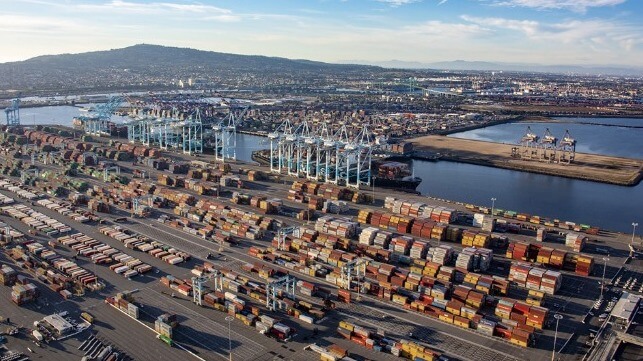FMC Commissioners Support Bill to Strengthen Antitrust Powers

U.S. legislators continued to target the business practices of the shipping industry seeking to revise the Ocean Shipping Act to increase the authority of the Federal Maritime Commission and stop what they see as abusive behavior that they believe is anticompetitive. For the third time in less than a month, a bill has been introduced before the U.S. House of Representatives, this one called the Ocean Shipping Competition Enforcement Act, which comes with the support of FMC Commissions Max Vekich and Carl Bentzel.
According to the bill’s sponsor, Representative John Garamendi of California, the proposed legislation would allow the Federal Maritime Commission to block any agreements among ocean carriers and marine terminal operators determined to be unreasonably anticompetitive without having to first obtain a federal court order. Current federal law requires the FMC, which is an independent federal regulatory agency, to review proposed agreements between ocean carriers or marine terminal operators to ensure any such agreements are not unreasonably anticompetitive. However, the FMC cannot block an anticompetitive agreement without first obtaining a federal court order.
“The ocean shipping industry was the last transportation sector deregulated by Congress in 1984. Because of that, today the industry is now dominated by nine foreign-flagged ocean liners that openly collude under three carrier alliances handling some 80 percent of cargo. After reforming our nation’s ocean shipping laws for the first time in nearly a quarter century, Congress must ensure that the Federal Maritime Commission can do its job and fully enforce the law,” said Garamendi in a written statement after proposing the law.
Federal Maritime Commissioner Carl Bentzel called the proposed legislation a “vital fix,” that would provide the authority necessary to challenge an anticompetitive agreement. In December 2022, Federal Maritime Commissioners Vekich and Bentzel requested that the U.S. House Committee on Transportation and Infrastructure make this critical change in federal law.
“This legislation will simplify the process by which the FMC reviews agreements among the largest foreign-owned entities in our supply chain,” said Vekich. “While agreements often have pro-competitive benefits, it is important for the FMC, as the watchdog agency, to once again have the ability to determine when such agreements go too far and result in an unreasonable reduction in competition which produces an unreasonable decrease in service or increase in cost.”
The World Shipping Council has repeatedly spoken out against the continuing effort to further reform the Shipping Act and defended the alliances saying they permit carriers to share space and provide service to more ports. Contrary to the legislative assertions they argue that alliances increase competition among the carriers by extending their ability to service ports. The Council seeks to refute the claims of dominance by saying that there are no carriers with a capacity share above 20 percent. In addition, MSC and Maersk announced earlier this year that they would be winding down the alliance.
Garamendi in March joined with fellow legislators to prose other changes to the Shipping Act. One bill, Ocean Shipping Antitrust Enforcement Act would repeal the exemption for foreign ocean carriers from all U.S. federal antitrust laws. The other, Ocean Shipping Reform Implementation Act proposes prohibitions on U.S. ports from using the National Transportation Logistics Public Information Platform (LOGINK), which the sponsors contend is Chinese state-sponsored software. It would also allow the FMC to investigate foreign shipping exchanges to preempt improper business practices, with the sponsors specifically targeting the Shanghai Shipping Exchange. If passed, it would also direct the U.S. Department of Transportation to contract an independent auditor to examine the influence of the People’s Republic of China on the business practices of the Shanghai Shipping Exchange and report to Congress.

that matters most
Get the latest maritime news delivered to your inbox daily.
The legislators contend that these elements are necessary to finish what was started with the passage of the reform act in June 2022. Some elements they contend need to be clarified in the act which was signed into law last year, while other elements did not make it into the final legislation but are still required to improve shipping and address the problems for U.S. exporters.
Previous efforts to further reform the Shipping Act after last year’s law, however, failed to gain support in the previous Congress.
